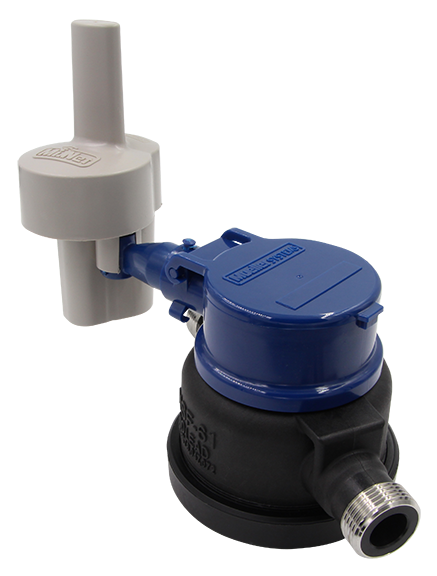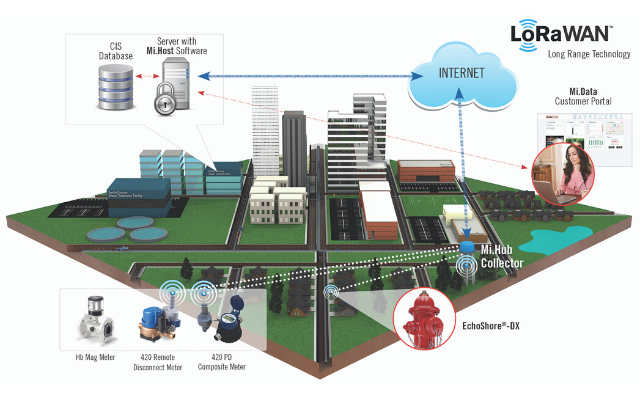Utilities relying on older “drive-by” Automatic Meter Reading (AMR) are upgrading to next-generation “smart grid” Advanced Metering Infrastructure (AMI) systems providing enhanced networked communications and control.
Named after the wife of King George III just before the American Revolution, Charlotte County, Florida is where centuries earlier a poisoned arrow abruptly ended Ponce de Leon’s search for the fabled Fountain of Youth. Instead of eternal youth, visitors to Charlotte County today seek the endless summer of its Gulf Coast beaches, including thousands of “snowbirds” from northern states who escape winter’s bite from Halloween to Easter every year.
Manually connecting and disconnecting water service for transient residents has been a longtime administrative hassle for the Charlotte County Utilities (CCU), but far more costly and labor-intensive have been the utility’s year-round water meter inspection visits collecting on-site water usage billing data from almost 60,000 Charlotte County residential and commercial locations.
Until a few years ago, Charlotte County collected water usage data the old-fashioned way: CCU employees walking house-to-house to collect meter readings. To cut costs and improve meter-reading efficiency, CCU launched a multimillion-dollar pilot program to replace a quarter of their 15-year-old manual water meters with Automatic Meter Reading (AMR) meters. Equipped with short-range radio transmitters, the AMR meters enabled “drive-by” data collection using vehicles equipped with specialized radio receivers to collect water usage data. Charlotte County’s experiment with AMR meters worked well — for a while.
Advanced Metering Infrastructure — AMI
“The radios built into those AMR meters consistently failed after a few years in service, but our meter vendor only offered a one-year warranty on those units,” said Joan Brown, Charlotte County Utilities business services manager. “Rather than replace those defective AMR meters at a cost of millions of dollars, we decided to replace all our 58,000 water meters with new AMI-based water metering technology from Mueller Systems.”
Advanced Metering Infrastructure (AMI) systems are next-generation “smart grid” technologies that provide enhanced networked communications and control between residential and commercial metering devices and utility or municipal data management systems. Unlike read-only AMR (automatic meter reading) devices, AMI technology enables continuously available two-way communications between the network and metering devices, enabling accurate measurement and collection of detailed usage and billing information, demand-response capabilities, customer alerts and notifications, remote service-connections and disconnections, and more.
Charlotte County Utilities engaged IoT-based AMI networks provider Mueller Systems for a pilot project evaluating their Mi.Net® AMI data-gathering system designed specifically for water utilities. Wirelessly linking meters, distribution sensors, and control devices for real-time access, the Mi.Net system uses specialized transceivers on metering devices to gather and pass wireless data to area data-hub collectors that aggregate and upload metering data to water utility servers or hosted servers for data processing.
AMI advantages and benefits
A successful 2012 pilot project replacing troublesome older water meters with new AMI water meters in a test area convinced the CCU to accelerate dramatically their timetable for a system-wide AMI meter changeover. Instead of the original 10-year transition plan, CCU decided to replace all 58,000 water meters within Charlotte County with the new Mi.Net network — in five years.
“Charlotte County quickly realized the many benefits of moving to a network-based AMI system,” said Cory Sides, National Account Manager for Mueller Systems. “AMI systems enable utilities to receive continuous real-time usage data that allows early detection of water leaks, unusual usage patterns, and evidence of meter tampering. Cutting labor and vehicle costs, decreasing water losses, and reducing billing errors helps lower water rates for both utilities and ratepayers, and enhances overall customer service and satisfaction.”
The Mi.Net system’s command-and-control functionality and wireless connectivity enables flexible scalability for accommodating system growth and adding future capabilities. The system’s real-time connectivity and two-way communications will enable enhanced services and features delivered through an online “customer portal” that will allow Charlotte County’s users to monitor and compare water usage and billing history in the future.
 AMI Network Operations Center (NOC)
AMI Network Operations Center (NOC)
Those Halloween-to-Easter “snowbirds” and other seasonal residents and visitors to sunny Charlotte County also receive the special AMI remote-connect/disconnect water meters, easing the hassle of frequent on-site visits required with the older water meters. The AMI system has also provisioned a special “district management” feature that enables the utility to identify mysterious water losses within a certain geographical area by installing AMI water meters at different points within the water distribution system.
“Another big advantage of AMI technology is seamless integration with large-scale advanced leak-detection and pipe assessment platforms,” says Mueller Systems’ Cory Sides. “The Mi.Net system enables utilities to add advanced capabilities as their needs evolve, and deploy new technologies that generate additional revenue streams as they become available. It’s a true ‘smart cities’ approach that helps utilities and municipalities to reduce costs, boost efficiencies, integrate services, and create a flexible data-collection infrastructure to meet the demands of the future.”
Striving to achieve operational self-sufficiency, CCU assigns staff members to be cross-trained “champions” of third-party systems and technologies vital to utility operations, including the new AMI system and components. Mueller Systems maintains a specialized network operations center (NOC) staffed by technicians who monitor and maintain multiple AMI networks for client utilities and municipalities across North America to ensure peak operational efficiency. Charlotte County plans to monitor and maintain their AMI network with their own NOC in the future, and a designated CCU staffer is collaborating with Mueller Systems NOC technicians to become capable of troubleshooting and rectifying system problems as they occur.
 99% meter-reading success rate — and a 20-year ROI
99% meter-reading success rate — and a 20-year ROI
Enjoying a 99% meter-reading success rate with their AMI system, Charlotte County’s internal auditing indicates the read-accuracy of their new AMI meters has resulted in an average revenue gain of $400,000 per year. Charlotte County estimates savings over costs of the new AMI system to achieve $2 million by the seventh year of their 10-year plan, and $3.6 million in Year 10 — a capital improvement project success story delivering a measurable return on investment.
“Our relationship with Mueller Systems is a true long-term partnership, which is important to us because this relatively new AMI technology is going to continue to evolve,” says Joan Brown.




